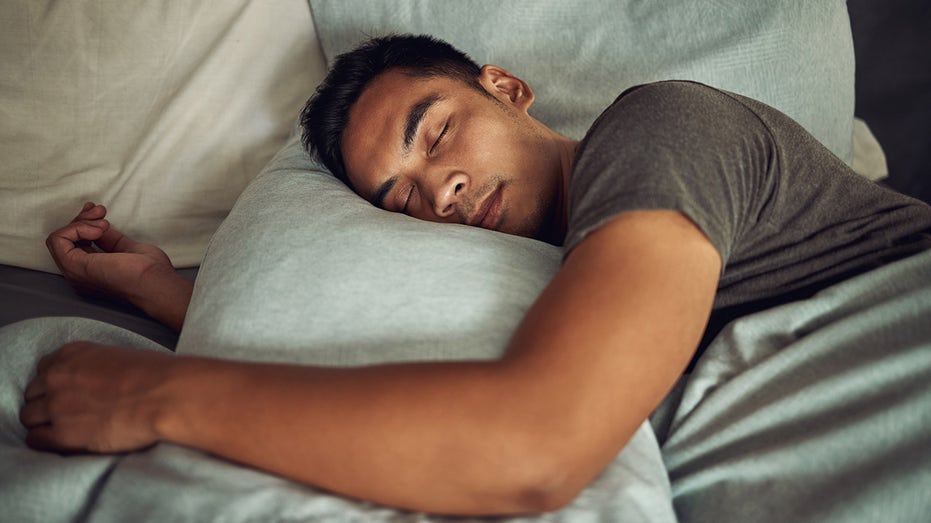We may need to redefine what a good night’s sleep really means.
Adults who maintain an optimal sleep schedule with regular bedtime and wake times have significantly lower mortality compared to those with an irregular and less sufficient sleep pattern, according to a recent study.
“Results suggest [the] benefits of expanding the public conversation on getting ‘a good night’s sleep’ and broadening this goal to getting many good nights of sleep, in a row, on weekdays and weekends,” lead researcher Joon Chung said in a press release.
WANT TO GET BETTER SLEEP? EXERCISE FOR THIS LONG EVERY DAY
Chung has a doctorate in sociology and is a post-doctoral research fellow at Harvard Medical School and in the division of sleep and circadian disorders at Brigham and Women’s Hospital in Boston, Massachusetts.
Researchers presented their findings at the 37th annual meeting of the Associated Professional Sleep Societies, held on June 3-7 in Indianapolis, Indiana.
A research abstract describing the research in detail was published in an online supplement of Sleep just last month.
The researchers used data from the Multi-Ethnic Study of Atherosclerosis Sleep Study to evaluate over 1,750 participants for a median follow-up of seven years.
They analyzed the sleep patterns of the participants, specifically the consistency and duration of sleep, using wrist actigraphy that the participants wore for seven days.
A wrist actigraphy is worn like a watch to evaluate sleep patterns by measuring activity through light and movement, according to Stanford Medicine.
Of the group of over 1,750 people, some 1,015 adults were categorized as “regular-optimal” sleepers, while 744 were identified as “irregular-insufficient” sleepers, according to Medscape, which reviewed the study.
In the follow-up period, 176 people passed away.
Participants with regular and healthy sleep schedules had an approximately 40% lower risk of dying from any cause compared to those with irregular and insufficient sleep patterns, regardless of socio-demographics, lifestyle, health status and major sleep disorders.
The authors concluded the regular sleepers tended to outlive irregular sleepers, regardless of a major sleep disorder.
CARE ABOUT YOUR HEART? TRY GETTING BETTER SLEEP, NEW STUDY SUGGESTS
“This study joins a body of evidence linking poor sleep with higher mortality,” Dr. Baljinder S. Sidhu, a pulmonologist and sleep specialist who is the co-owner of Pacific Coast Critical Care Group in southern California, told Fox News Digital.
Dr. Sidhu pointed to a prior nursing study that followed 78,500 women over approximately 10 years that supports the research.
The Nurses’ Health Study found that those who worked at least three nights per month, in addition to their day and evenings shifts, found a higher risk of breast cancer — especially among women who worked 30 years or more on the night shifts.
Previous research also revealed higher mortality with short sleep durations, prescription sleeping pill use and sleeping too much (> 8.5 hours), Sidhu added in an email.
Recent studies also show that unhealthy sleep patterns lead to worse outcomes.
A recent international study found a significant association between sleep impairments and the risk of acute stroke, noting a cumulative increase in stroke risk as sleep symptoms increased, according to research published in Neurology this May.
The risk of an acute stroke increased with sleeping less than five hours, sleeping more than nine hours, poor sleep quality and symptoms of snoring.
Getting “7-8 hours of sleep of regular consistency (to allow normal circadian rhythm) reduces risk from a number of causes of death (accidents, cardiovascular, cancer, etc.),” Dr. Sidhu noted in an email.
Drowsy driving leads to thousands of accidents each year, most often when people’s circadian rhythm dips, according to the National Highway Traffic Safety Administration.
“Healthy sleep” is not only about getting sufficient quality sleep on a consistent basis, but also having regular bedtimes and wake times, per the study.
“If sleep were an eight-hour pill, it would be beneficial to take the full dose at regular times, consistently,” Chung added in a release.
One simple goal is to be consistent.
Go to bed at the same time every night and wake up at the same time each morning, including on weekends, according to the American Academy of Sleep Medicine.
It also reminds people to use the bedroom only for sleep and for sex.
And if you try going to sleep but can’t fall asleep within 20 minutes, it’s best to get out of bed.
Do a quiet activity without a lot of light exposure until you are tired. But avoid any electronic devices, remembering to turn them off 30 minutes before bedtime.
CLICK HERE TO SIGN UP FOR THE LIFESTYLE NEWSLETTER
Try to avoid large meals before bedtime, avoid caffeine and alcohol in the evening — and reduce fluid intake before bed.
Article Source: Health From Fox News Read More




